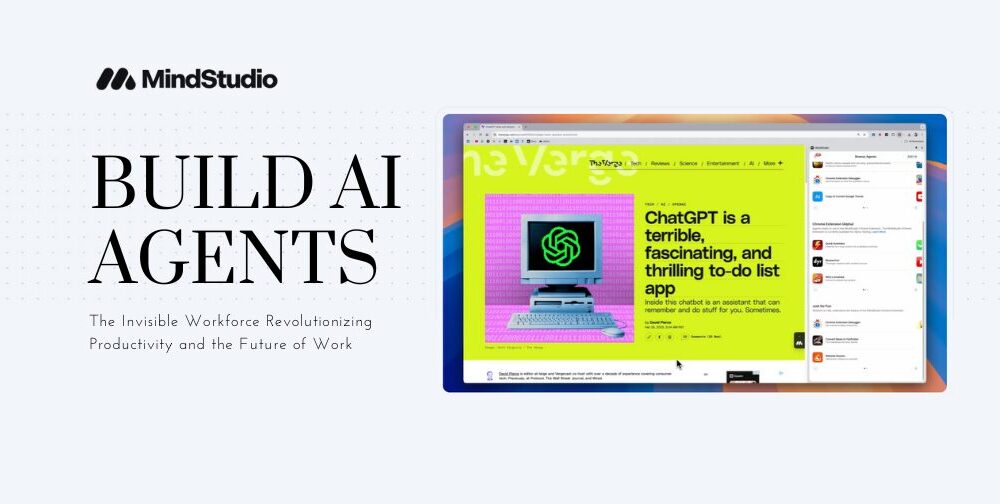How To Build AI Agents: The Invisible Workforce Revolutionizing Productivity and the Future of Work

Artificial Intelligence (AI) agents have emerged as transformative tools, revolutionizing the way individuals and organizations accomplish tasks. These autonomous programs are designed to perform specific functions with minimal human intervention, leading to increased efficiency and productivity across various sectors. Platforms like MindStudio have been at the forefront of this revolution, offering user-friendly interfaces to build and deploy custom AI agents without the need for extensive coding knowledge.
The concept of AI agents isn’t entirely new; however, recent advancements in machine learning and natural language processing have significantly enhanced their capabilities. These agents can now understand context, learn from data, and make decisions, allowing them to handle complex tasks that were once the sole domain of humans. For instance, AI agents can now draft complex legal documents, create mental health protocols, and even write books, showcasing their versatility and potential.
MindStudio: Democratizing AI Agent Development
MindStudio has played a pivotal role in making AI agent development accessible to a broader audience. Their platform enables users to create sophisticated workflows using language, image, and voice models without writing a single line of code. This democratization of AI technology empowers businesses and individuals to harness the power of AI without the traditional barriers of technical expertise.
Applications Across Industries
AI agents have found applications in various industries, streamlining operations and enhancing productivity:
- Marketing: Teams utilize AI agents to transform long-form content into bite-sized pieces suitable for social media and email campaigns, ensuring consistent and engaging communication with audiences.
- Customer Support: Multinational companies deploy AI agents to translate and enrich customer messages in real-time, breaking down language barriers and improving customer satisfaction.
- Human Resources: AI agents assist in building buyer personas based on customer interviews, aiding HR departments in understanding and targeting potential candidates more effectively.
- Finance: Financial institutions employ AI agents to classify transactions for tax reporting, reducing errors and ensuring compliance with regulatory standards.
Impact on Workforce Efficiency
The integration of AI agents into the workforce has led to measurable improvements in efficiency. For example, JPMorgan Chase reported a 10% to 20% increase in software engineers’ efficiency by utilizing a coding assistant tool. This enhancement allowed the bank to reassign engineers to other projects, optimizing resource allocation and productivity.
Future Projections
The trajectory of AI agent development suggests a future where these tools become even more integral to daily operations:
- Coding and Software Development: Anthropic’s CEO predicts that within the next three to six months, AI will be writing 90% of the code that software developers currently handle, potentially leading to AI generating all code in a year.
- Virtual Employees: OpenAI’s CEO anticipates that virtual employees, powered by AI agents, could join the workforce as early as this year, automating up to 30% of work activities in the US economy by 2030.
Challenges and Considerations
Despite the promising advancements, the widespread adoption of AI agents presents challenges:
- Job Displacement: As AI agents become capable of performing tasks traditionally handled by humans, there is a growing concern about job displacement, particularly among remote, laptop-based workers. Professions such as journalism, software engineering, and accounting, which benefit from location flexibility, are now highly susceptible to AI replacements.
- Ethical and Security Concerns: The autonomy of AI agents raises significant concerns about security and unintended actions. There is a pressing need for robust safeguards to manage these risks effectively.
- Business Models: While the potential of AI agents is vast, their business models remain uncertain. Companies are investing heavily in AI agent development, but the actual implementation and training of these systems can be complex and time-consuming, with unclear returns on investment.
MindStudio’s Role in Addressing Challenges
MindStudio addresses these challenges by providing a platform that emphasizes ethical AI development and offers tools for monitoring and optimizing AI agent performance:
- No-Code Development: By enabling users to build AI agents without coding, MindStudio reduces the barrier to entry, allowing more individuals and organizations to participate in AI development.
- Enterprise-Grade Monitoring: The platform offers enterprise-grade monitoring, observability, and reliability, ensuring that AI agents operate within defined parameters and that any anomalies are promptly addressed.
- Partnership Opportunities: MindStudio collaborates with various partners to promote ethical AI practices and develop solutions that align with industry standards and regulations.
Conclusion
AI agents are poised to revolutionize the way we approach tasks, offering unprecedented levels of efficiency and productivity. Platforms like MindStudio play a crucial role in this transformation by making AI accessible and manageable for a wide range of users. As we move forward, it is essential to address the challenges associated with AI adoption, ensuring that the integration of AI agents into various sectors is both beneficial and ethical.

Source: How To Build AI Agents: The Invisible Workforce Revolutionizing Productivity and the Future of Work





